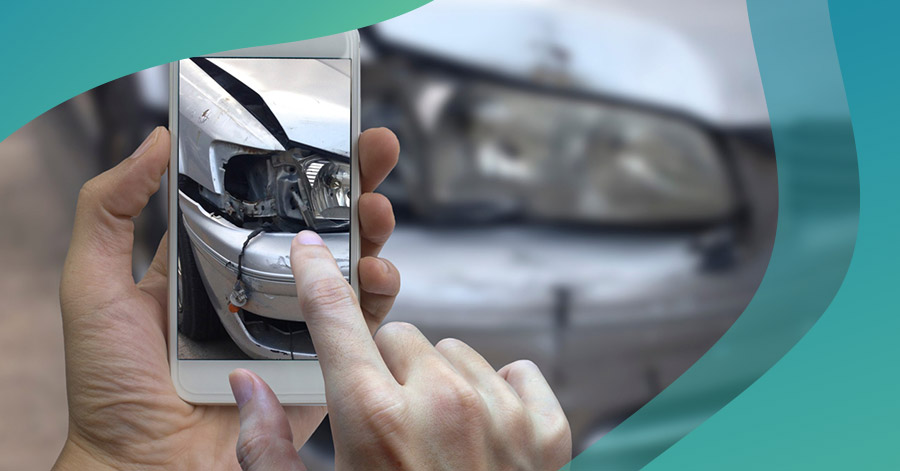- Home
- »
- Blog
- »
- Claims Help
- »
- In an accident but didn’t get the other driver’s information?
It happened: you got in an accident, and to make matters worse, you didn’t get the other driver’s information. Maybe this accident was a hit-and-run, where someone left the scene after a collision without stopping. Maybe you were flustered from the accident itself and simply forgot to ask for the other driver’s info. Or maybe the other party simply wouldn’t divulge anything!
Regardless, the unfortunate fact is that the responsibility is now on you to fill in the missing pieces. But don’t panic — we’ll guide you through what to do if you didn’t get the right information after an accident.
If the accident was a hit-and-run
When the other driver leaves the scene of an accident before you can exchange information, it’s technically considered a hit-and-run (even if the damage is minor), which is classified as a felony. If you find yourself the victim of a hit-and-run, your next steps are very important.
Get to a safe place
Your first priority in this situation is yourself and your passengers, as the other party involved didn’t stick around. Make sure everyone is in a safe place by moving as far off the roadway as possible. However, it’s important that you stay at the scene of the accident.
No matter what, always check to ensure you and anyone who might have been in the car with you are safe and injury free. Even if you feel fine, you may need medical attention: things like whiplash and brain injuries often don’t display symptoms right away, and shock can dull pain.
Check for and speak with witnesses, if available
See if anyone around you saw the accident and would be willing to provide details. They might have noticed things you didn’t notice in the moment, such as which direction the other car drove off in. Make sure to get their contact information in case the police or your insurance company need to get in touch with them.
Call the police
It’s incredibly important to always call the police in the event of an accident. This is even more important in the event of a hit-and-run! Report the accident to the police within 24 hours, but the sooner the better.
Take photos
Think of it as playing detective — you want to accurately capture the scene of the incident and the state of your vehicle. However, please note that you shouldn’t get out of your car if you’re still on the road or close to it. Being outside your vehicle near traffic is incredibly dangerous, so wait until you’re in a safe location and/or police have arrived on the scene. Take photos of the damage to your car, and anything in the surrounding area that might be evidence. Even small details can be important. Something like a photo of a paint transfer might help the police track down the offending vehicle.
Will my insurance cover a hit-and-run?
Good question. Yes, insurance can help in the case of a hit and run, but you’ll want to make sure you’re covered through your policy by uninsured motorist coverage or underinsured motorist coverage. These coverages help to cover the gap between your costs and the other driver’s ability to pay. They can also cover you should you get in an accident with a hit-and-run driver.
How will a hit-and-run impact my insurance rate?
Unfortunately, whether you’re at-fault in an accident or not at-fault, there’s always the possibility of a premium increase when an accident or violation happens. Most insurance carriers now take all loss history in account in some shape or form when determining your insurance rate, including hit-and-runs. Every insurance provider prices differently, but your premium could increase depending on the situation of an accident, your claims history, and the type of coverage plan you have.
If the other driver refuses to give their information
Tempers can flare at the scene of an accident, and not everyone you meet will cooperate in these situations. So, if the other driver refuses to give their information after an accident, what are you supposed to do? In addition to steps above (checking for witnesses and taking photo to accurately capture the damage to your vehicle after getting to safety ), follow these steps:
Keep your cool and do your best to stay calm
Even if the other driver is angry, don’t stoop to their level. Anything you say or do can be used against you, even if there aren’t any other witnesses. If the other driver becomes belligerent, stay in your car with the windows rolled up.
Call the police
Again, the police should be called no matter what, but especially in cases where the other party is not cooperating with you. They can intervene and get details you might not be able to get on your own. They can also help if the other driver decides to leave the scene.
If you forgot to get their info
Getting in an accident is stressful no matter the circumstances, so it’s common to feel overwhelmed by emotion and adrenaline in the moment. That’s why people often forget to exchange information after an accident. If you’re ever in an accident and realize you didn’t get the other driver’s info, there are still steps you can take to handle the situation.
Focus on what you can remember
Write down everything you can remember about the vehicle and/or individual, including things like the make and model, the color of the vehicle, and the license plate number, if you can remember it. You should also be as detailed as possible when noting the location of accident. This will be helpful when speaking with the police and will also be helpful for your next step.
Notify your insurance company
Yes, you should notify your insurance company even if you don’t have the other driver’s insurance information. You should also notify them even if the accident was your fault. Most insurance companies have a “notification and cooperation clause”. This clause means you need to tell them about any accident you’re involved in and cooperate with any investigation they decide to do. Notifying them is also helpful in case the other party somehow gets in touch with them. They can better help you if they already know the details and aren’t taken by surprise.
Call the police
Here it is again! In every accident scenario, no matter the exact situation, it’s important to alert the police. If everyone seems to be unharmed, or the accident appears to be minor, you can use your area’s non-emergency police number. In cases of emergency, injury, or serious damage, dial 911. When they arrive on the scene, make sure you ask for a copy of the report as you may need it when filing your claim.
At Elephant, we want you to be prepared for any situation on the road
There’s no such thing as a “good time” to get in an accident. We understand that an accident where you’re left without the other driver’s information, whatever the reason, is especially frustrating. But following these steps will help you take control of the situation—and help you get back on the road. Make sure you’re covered should an accident or a hit-and-run happen by getting a quote with Elephant or logging in to review your current coverages. And, if you are able to get the other driver’s information after you’ve been in an accident, take steps to file a claim against their insurance.
Article last updated on June 25th, 2023 at 7:16 pm

